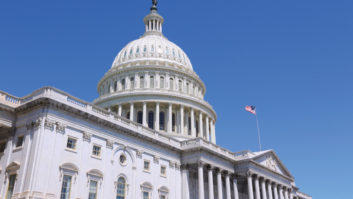The Multicultural Media, Telecom and Internet Council is celebrating Black History Month by honoring the contributions of past and present African-American FCC leaders.
The organization which advocates for equal opportunity in the tech, media and telecom industries named seven FCC chairs and commissioners, including current Commissioner Geoffrey Starks.
The late Benjamin Hooks, who in 1972 became the first African-American commissioner in the FCC, is also among the honorees. According to one of Hooks’ memoirs, at the time when he arrived, of the FCC’s 2,200 employees, only five were black. Upon Hooks’ departure, there were more than 70 black employees at the commission.

In a release, the MMTC provided the following background on the seven leaders it honored:
Geoffrey Starks, who has served as an FCC commissioner since 2019.
MMTC wrote: “Starks is a champion for the millions of Americans who lack access to or cannot afford a home internet connection. He advocates for consumer protection and accountability, particularly in managing the Universal Service Fund. Also, he is a leader on national security policy, working to eliminate untrustworthy equipment from America’s communications networks. Prior to his federal public service, Starks was an attorney at Williams & Connolly. Learn more here.”
Mignon Clyburn became the first African-American woman FCC commissioner and acting chairwoman.
MMTC wrote: “Clyburn served the FCC as a commissioner from 2009—2018. She led the FCC as acting chairwoman for six months in 2013. During her tenure, she was committed to closing the digital divide and championed the modernization of the agency’s lifeline program. She also promoted diversity in media ownership, initiated inmate calling services reforms, supported inclusion in STEM opportunities and fought for an open internet. Currently, she is the president of MLC Strategies, a Washington, D.C.-based consulting firm that provides advice and critical solutions in the technology, media, telecommunications and investor-owned utility industries. She also serves on Lionsgate‘s board of directors.”
Benjamin Hooks, a civil rights leader, minister, and attorney who became the first African-American FCC commissioner in 1972.
MMTC wrote: “During Hooks’ tenure, he addressed the lack of minority ownership of television and radio stations, the lack of minority employment in the broadcasting industry, and the image of African-Americans in the mass media. After the FCC, he became the executive director of the NAACP. He died in 2010, leaving the Hooks Institute to promote his commitment to social change. Learn more here.”
Andrew Barrett, an attorney and former teacher, served as an FCC commissioner from 1989—1996.
MMTC wrote: “Barrett was known for being an outspoken and fiercely independent commissioner who championed consumer outreach and engagement. Before coming to the FCC, he was a commissioner on the Illinois Commerce Commission. Before that he was a civil rights leader in Chicago. After leaving the FCC, he joined the Edelman Public Relations Worldwide.”
Tyrone Brown served as an FCC commissioner from 1977—1981.
MMTC wrote: “Brown was a leader in the development of the FCC tax certificate policy. He also was one of the members of the Syncom group of African-American-owned venture capitalists that invested funds to purchase Iridium Satellite from Motorola out of bankruptcy. He served as a consulting counsel at Wiley Rein.”
Michael Powell, president of the NCTA — The Internet & Television Association, served as the FCC chairman from 2001—2005 and a commissioner from 1997—2001.
MMTC wrote: “During his FCC tenure, he oversaw the rapid transformation of communications markets into the digital age. As a result, the internet came into widespread commercial use, as did smartphones, Wi-Fi networks and satellite radio. Prior to joining the FCC, he worked as the chief of staff of the antitrust division in the Department of Justice. Learn more here.“
William Kennard, the chairman of AT&T’s board of directors, served as the FCC chairman from 1997—2001 and its general counsel from 1993—1997.
MMTC wrote: “During Kennard’s tenure, he shaped policies that created an explosion of new wireless phones, brought the internet to a majority of American households and resulted in a significant investment in new broadband technologies. He also implemented new policies to bridge the digital divide in the U.S. and around the world. He also served as the U.S. ambassador to the European Union from 2009—2013. Learn more here.“







